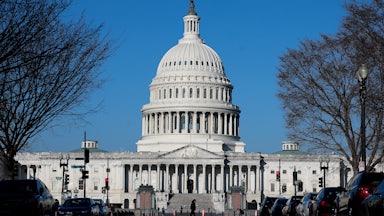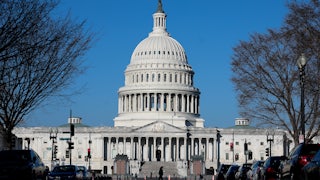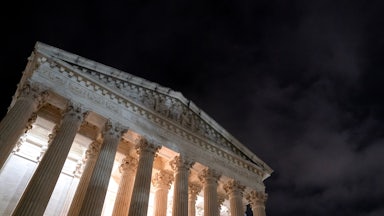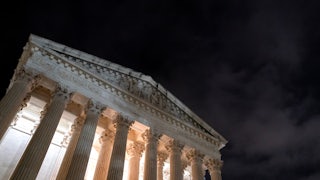Earlier this month, Democrats on the House Oversight Committee released an explosive report documenting that Donald Trump’s businesses pocketed at least $7.8 million in payments from foreign governments during his presidency. Disturbingly, the report noted that Democrats could have uncovered far more such foreign booty but were thwarted when GOP capture of the House deprived them of subpoena power.
So why aren’t Senate Democrats—who do have subpoena power, as they are in the majority—following up on the House Democrats’ investigation?
The payments appear to violate the Constitution’s prohibition on presidents accepting payments or gifts from foreign governments without Congress’s consent. And yet, as detailed in the report from the committee—where Representative Jamie Raskin is the ranking Democrat—committee Republicans appear to have released Trump’s accounting firm from complying with disclosure under a subpoena previously issued by Democrats, effectively shutting the investigation down.
In recent days, according to a source familiar with the situation, Raskin has approached Senate Democrats and made the case that they might consider using their subpoena power to continue the investigation into the unconstitutional payments.
“I am hopeful that our colleagues in the Senate will explore any avenues they may have to recover the hidden information,” Raskin told me. “Trump’s brazen pocketing of foreign government payments was an insult and affront to both the House and Senate, which together have the sole power to approve or disapprove such payments.”
What the report did document is extraordinary on its own: payments from at least 20 foreign countries and entities to a series of Trump businesses, including Trump hotels in Washington and Las Vegas, and Trump Tower in Manhattan. Those include more than $5.5 million from China and more than $615,000 from Saudi Arabia.
Raskin has receipts—literally. Democrats secured a wealth of documentation of these payments from Mazars, Trump’s former accountant, after a long court fight compelled the firm to honor their subpoena. But early last year, Trump’s attorneys informed Mazars that the new GOP majority had relieved it of completing this obligation, according to an email obtained by committee Democrats.
The result? The $7.8 million in documented payments to Trump’s businesses represents money from abroad during only two years of his presidency. As the report concluded, that is “almost certainly only a fraction of Trump’s harvest of unlawful foreign state money.”
Raskin said Democrats will likely renew the subpoena on Mazars for information from the other two years of Trump’s presidency if they win the House this fall. Until then, he said, Democrats “must now pursue other ways of getting documents” to “vindicate the constitutional prohibition on foreign state emoluments and our institutional role in enforcing it.”
Senate Democrats clearly have the authority to pick up where Raskin left off by trying to extract the remaining information from Mazars, said Sarah Binder, a congressional expert at George Washington University. A number of committees—the Homeland Security, Judiciary, Foreign Relations, and Finance committees—very likely have some form of jurisdiction, and Binder noted that each can issue subpoenas with a simple majority vote. Democrats hold majorities on all those committees.
“The Senate committees could certainly use subpoena power to probe the allegations,” Binder told me. The range of committees that can act here “is broad,” Binder added, and Democrats could at a minimum “tackle the issue” of which committees could appropriately pursue the matter further.
So will they? Spokespeople for Senators Richard Durbin and Gary Peters—who chair the Judiciary and Homeland Security committees, respectively—declined to comment or didn’t return emails.
By contrast, Senator Ron Wyden, who chairs the Finance Committee, appears open to the idea. “Trump’s ties to autocratic regimes in the Middle East and China in particular demand scrutiny from Senate Democrats,” Wyden said in a statement sent to me.
Wyden’s committee has been investigating whether Qatar helped finance a billion-dollar bailout of a property owned by the family business of Jared Kushner, Trump’s son-in-law, and whether it influenced Trump administration policy. Raskin’s report, he said, shows “how easy Trump made it for corrupt foreign governments to put money directly in his pockets.”
Similarly, Senator Richard Blumenthal, who chairs the Investigations Subcommittee on the Homeland Security panel, called Raskin’s report “thorough and damning.” In a statement, Blumenthal, who sponsored legislation codifying protections against such unconstitutional violations, added that “the full extent of former President Trump’s foreign dealings is certainly a matter of public interest meriting additional attention and action.”
One reason for the hesitation might be that to refer any ignored subpoenas for prosecution, the Senate must marshal 60 floor votes to overcome the inevitable GOP filibuster, said congressional expert Norman Ornstein. But, he added, this “doesn’t mean you shouldn’t do a subpoena in the first place.” Why not force Republicans to vote to shield Trump’s glaring corruption yet again?
Acting on Raskin’s findings is right on the substance. Trump, who is running for president again, is already signaling he won’t divest from his business interests in a second term. The Senate has an unimpeachable legislative purpose: Trump’s serial violations and brash flaunting of more to come show we need new disclosure requirements—or perhaps a new mechanism requiring presidents to get congressional approval—on such emoluments.
Then there’s the politics. A big reason Republicans have manufactured fake scandals about President Biden and foreign dealings is to ensure that Trump’s actual corruption—and his likely criminality—gets lost in a fog of both-sides news coverage. Yet as Brian Beutler writes on Substack, the reaction to Raskin’s report shows that when compelling evidence of Trump’s foreign payments emerges, media coverage does graphically convey the blunt, dirty truth about them, blowing through any both-sidesing tendencies.
In fact, as a recent viral exchange between Raskin and a hapless GOP congressman showed, when these receipts are thrown in the faces of Republicans, they have absolutely nothing to say in response. They give Democrats a way to create a powerful public spectacle, in which the fake Biden scandals shrivel up in the heat of terrible revelations that are very real.
It’s clear that a lot of information about Trump’s foreign dealings remains to be unearthed, as Raskin revealed by showing us the tip of this particularly Trumpian iceberg. Senate Democrats have the power to shed light on it. The American people deserve confidence that presidents will represent the nation’s interests in their dealings abroad, not their own naked financial self-interest. Democrats should act on—and align themselves with—this principle.
It’s inarguably the right thing to do, and it’s good politics. After all, Democrats cannot count on the voters knowing the truth about Trump’s bottomless corruption all on their own.










